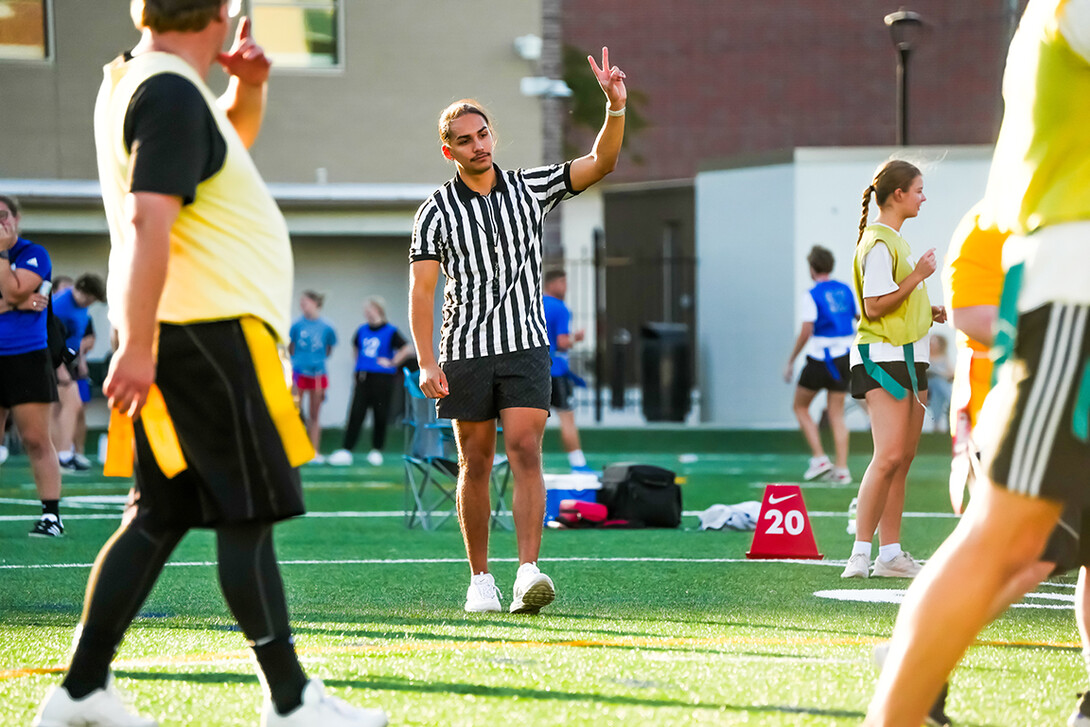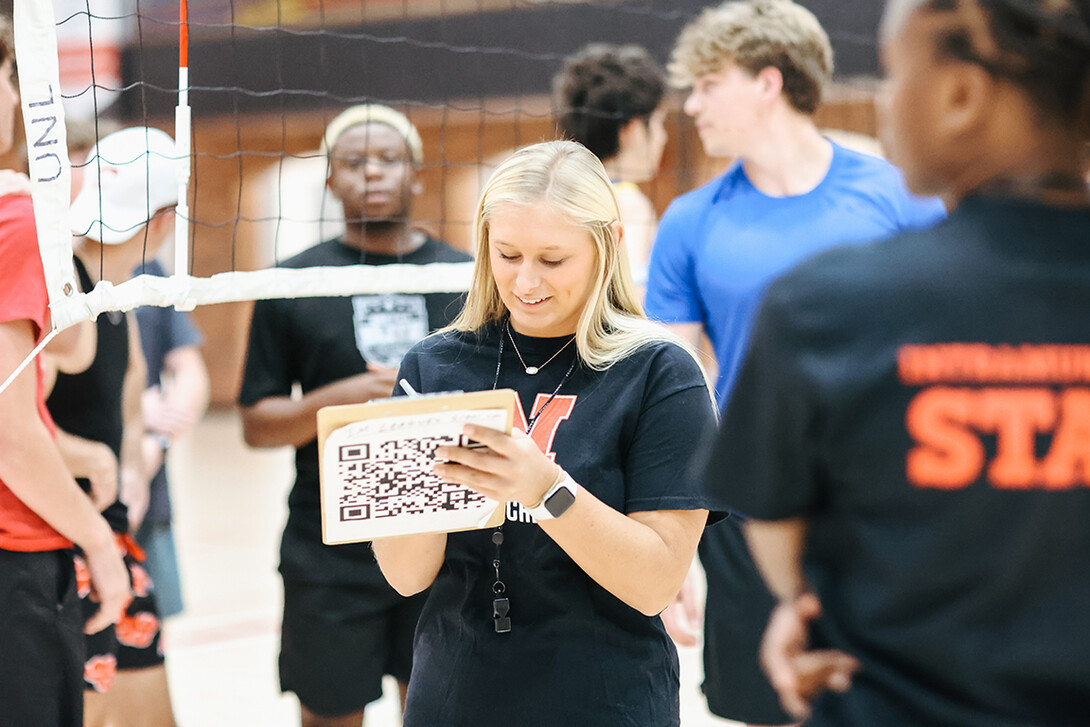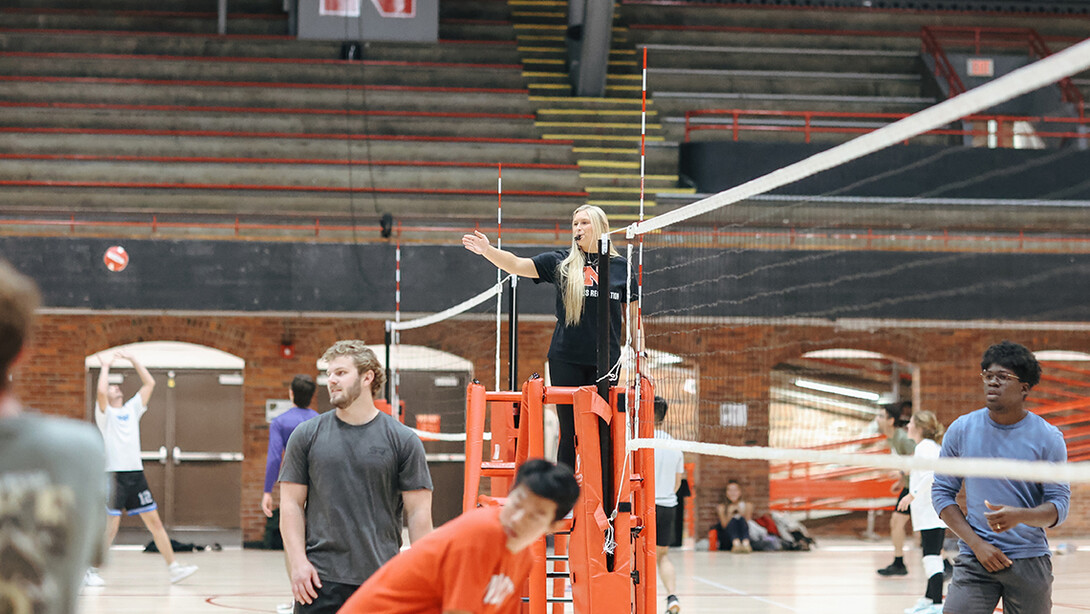
Student referees and umpires keep intramural sports at the University of Nebraska–Lincoln’s Campus Recreation running smoothly. While creating a fun, competitive atmosphere and building relationships, they also develop skills they will carry with them long after they leave the job.
“They are gaining leadership skills, working on conflict management, communication,” said Aaron Dueker, assistant director for sport programs. “Being an official is going to make you a better teacher, a better lawyer, a better doctor, and we try to connect those dots for them. We’re very intentional about developing our students, not just as officials, but as people.”
Students hired as intramural officials — between 100 to 120 across all sports per year — complete a classroom training session to get information about the rules of the games, followed by a field training session to get a practical sense of what they will be looking for during a game. Student official Bennett Yellow Bird, a senior in nutrition, exercise and health science from Sioux Falls, South Dakota, said the hands-on training is key to a deeper understanding of the rules.
“You can make an association with a foul or a penalty when you see it happen live,” he said. “It helps reinforce learning a lot.”
This overlaps with the reasons Campus Recreation staff encourage the student officials to also play on a team. Many students officiate and play multiple of the center’s five officiated intramural sports. In addition to allowing more students to enjoy participating in the game, playing gives officials a better understanding of the rules and of what officials deal with when trying to make the right call, said Alyssa Kerr, sport programs coordinator.
“If you ever have a foul called against you or a penalty called against you, you get that moment of, ‘I understand what I did wrong here,’” Kerr said.
A student will typically officiate around six to nine games each week. Yellow Bird said they get to know players during all that time and start to develop relationships and even friendships. He said those bonds ease lines of communication between him and the players and aid with one of the challenges of the job, de-escalating the situation if competitive tensions rise.
“When they play and things get a little heated, I can go to them,” he said. “Buildings those connections helps. We’re all students here, we all have exams, we’ve all got classes. It helps them realize we’re students just like they are.”
Kaila Lorence, a senior in communication sciences and disorders from Fremont and student official, said intramural sports brings together people from many different backgrounds and fields of interest, and this creates a community that makes the job feel like simply going to watch sports with friends. Getting to know players helps officials adjust to how competitive each team wants to be and create the best environment possible.

“Working as an official helped me reach and get to know people I never would have gotten to know outside of this,” Lorence said. “That’s a really special thing about our program, that we’re so diverse with our majors and people we employ that you get that extra group outside of your normal classes and clubs. You’re gaining another friend group.”
In general, the peer-to-peer interaction makes players feel more at ease if they want to approach them about a call or have any other questions, Kerr said, and contributes to a level of comfort between officials and players.
“The way you dialogue with a peer is going to look very different than the way you may if you were officiating a youth football game or youth basketball game,” Kerr said. “I feel like there is more comfort that comes with seeing a peer officiating. If they do have questions, they can take them to the peer because it might be someone they have class with.”
Lorence said the work has helped her learn more about how to effectively communicate a decision she’s made and also boosted her confidence in interacting with others. Students receive feedback from Campus Recreation staff regularly and try to improve as an official after every game, Lorence said, but she’s also developed as a person from her experience in the job.
“From not being able to be confident in talking to groups of people, now I’m a staff assistant, so I walk up to groups of people and it’s a part of my everyday job,” Lorence said.
Instilling these kinds of lifelong skills, Kerr said, is part of giving students something to carry with them to whatever they do in the future and helping them develop as people as they move into careers.
“You see that confidence grow and you see them open up,” Kerr said. “Seeing the way they navigate that and start to become comfortable with that over the course of the year is a really big thing for their confidence, their leadership and feeling like they’ve got a spot here at Nebraska.”








